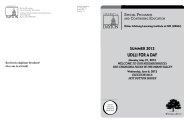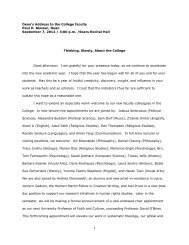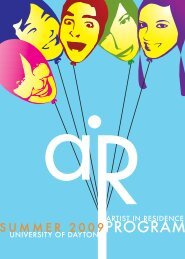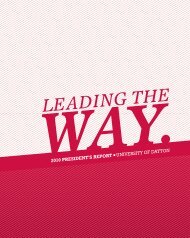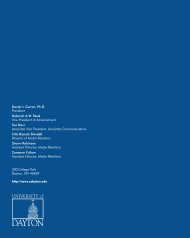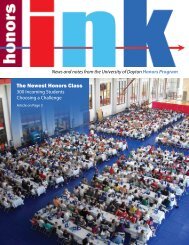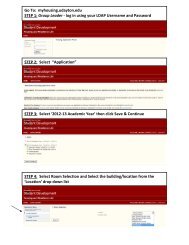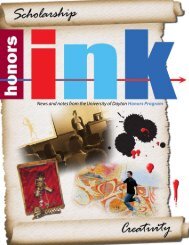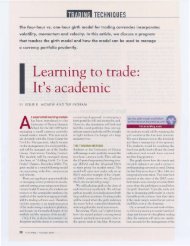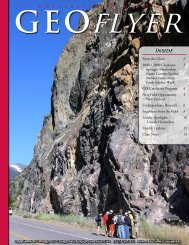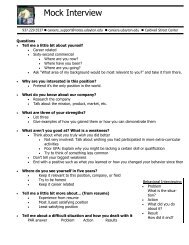UDSL Job Search Manual - University of Dayton
UDSL Job Search Manual - University of Dayton
UDSL Job Search Manual - University of Dayton
Create successful ePaper yourself
Turn your PDF publications into a flip-book with our unique Google optimized e-Paper software.
Know Yourself<br />
Proper preparation for an interview includes a<br />
lengthy self-assessment. You must be prepared<br />
to speak intelligently about what qualifies you<br />
for the position you are seeking. We recommend<br />
you follow this 7-step program:<br />
1. Make a List <strong>of</strong> Your Accomplishments<br />
(personal and pr<strong>of</strong>essional).<br />
2. Note <strong>Job</strong>-related strengths (transferable<br />
skills) that each accomplishment proves.<br />
Example:<br />
Your Accomplishments:<br />
◗ Received CALI Award for Evidence<br />
◗ Won Walter Rice Moot Court<br />
Competition<br />
◗ Financed 100% <strong>of</strong> college expenses<br />
through part-time work (up to 30 hours<br />
week)<br />
◗ Started lawn service business that grew<br />
from $20,000 to $50,000 in annual sales<br />
over just two years<br />
Transferable Skills:<br />
◗ Well-versed in evidentiary issues<br />
◗ Effective oral and written communication<br />
skills<br />
◗ Organize time well; strong work ethic<br />
◗ Proven self-starter<br />
3. Prioritize Your Strengths (similar to how you<br />
organized your cover letter).<br />
Prioritize those transferable skills that would<br />
be most desirable to the interviewer. For<br />
instance, let’s say you are interviewing with<br />
a litigation firm. Your list <strong>of</strong> prioritized<br />
strengths might begin like this:<br />
◗ Effective communicator-proven through<br />
Moot Court success<br />
◗ Know evidentiary issues-proven by receiving<br />
highest grade in the class<br />
◗ Excellent time management skills-proven<br />
through the ability to work up to 30 hours<br />
per week while attending college full-time<br />
and graduate cum laude<br />
4. Be ready to subtly sell these points during the<br />
interview.<br />
5. Know your resume, cover letter and writing<br />
sample. Bring copies in a leather portfolio.<br />
6. Remember to be familiar with current<br />
events-an important part <strong>of</strong> many interviews<br />
is “small talk” to create rapport. To adequately<br />
prepare, be sure to read about local and<br />
national events in the newspaper and watch<br />
the news on the day <strong>of</strong> the interview. Avoid<br />
discussing controversial subjects such as politics<br />
and religion.<br />
7. Be aware <strong>of</strong> body language.<br />
While a candidate is interviewing for a job,<br />
the interviewer is evaluating both the words<br />
uttered and the body language exhibited.<br />
Entire books have been written on the<br />
messages we communicate through body<br />
language, but a few tips should help you<br />
avoid sending the wrong message.<br />
◗ Sit up straight<br />
◗ Don’t cross arms<br />
◗ Don’t fidget<br />
◗ Never look at your watch<br />
◗ Maintain eye contact without staring<br />
Often we are not even aware <strong>of</strong> the mixed<br />
signals we send with our non-verbal<br />
communication. Be sure to ask a friend or<br />
relative whether you display any nervous or<br />
annoying habits. Do you unwittingly wink at the<br />
person you are talking to? Do you look around<br />
the room while speaking? Do you tap your<br />
fingers when you are nervous? Do you slouch<br />
down in your chair? Do you have a nervous<br />
laugh? It is best to be aware <strong>of</strong> your habits so you<br />
can control them during an interview.<br />
32




